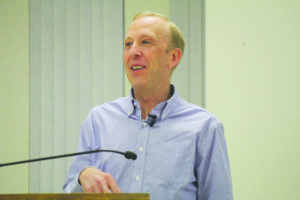‘We are more alive than ever’
Winchester says don’t believe what’s said about rural America
Headlines and publications illustrate Ben Winchester’s uphill battle against narratives that claim rural America can’t be thriving:
“From breakbasket to basket case” reads one headline.
Slide deck from Rewriting the Rural Narrative

Ben Winchester, sociologist with the University of Minnesota Extension, says the out- migration of urban workers to live in small towns keeps rural America alive, counter to what is often printed or published.
“Many small towns are playing a role in their own demise” and similar lead sentences appear in other newspapers and magazines. Small towns earn stereotype labels of “sleepy town” and “brain drain.” School consolidations and Main Street business closures are “one more nail in the coffin.”
“These are being told and written about us, not by us,” Winchester told more than 50 people gathered at Mayville State University.
Winchester is a sociologist with the University of Minnesota Extension. His point of view is, “Rural America is changing, not dying.”
Winchester believes total population of a rural town or county is not a true measure of success. He says occupied housing units are more accurate. Traill County’s population declined four percent in the last U.S. Census, but occupied housing units increased two percent.
Winchester says the narrative about rural America is “a one- way road out of town,” but his interpretation of data says urbanites may work in the cities, but they live in rural towns for life’s simpler pace, security and safety, and the low cost of housing.
Before his public address, Winchester talked with community leaders from Traill County about rural housing. He challenged
them and those in attendance, “Do you know what’s going on around you? Do you know what people in your town do?”
Winchester says job increases in education and health care show that agriculture is no longer the mainstay of Minnesota, much less rural America. He says people in their 30s through 50s are moving to and living in small towns, but they travel throughout the region.
“When you put rural counties together, you see diversity,” Winchester said. “We are more alive than ever! People want to move and live here. People choose to move and stay here.”
Winchester urged to avoid negative language about where they live around their children, “Don’t ever use negative language on your kids ever again. Kids hear everything. Spread the message of how great this place is.”
Panel discussion
Five people were asked by Jim Murphy, executive director of the Traill County Economic Development Commission, to take part in a panel discussion with Winchester and explain what drew them to live and work in Traill County.
Among the five were La Lynda and Zack Blotsky. She is principal at May-Port CG High School; he is a consultant for an oil company. They moved from congested oil country in western North Dakota.
“We wanted a slower pace of lifestyle, more peace and quiet to raise our children,” La Lynda expressed.
Robert Frederick moved from Cedar Rapids, Iowa at the be- ginning of 2020 to become chief information officer for Mayville State University Information/Technology Services.
“I was tired of the grind of the private sector,” Frederick said. “I thought if I was going to make a change, this is the right time.”
Brian Schatz agreed, “I’d rather pump gas in the country than work in a corporate office or culture.”
The former NDSU line- man had worked for CHS in Kindred and Gwinner before his wife saw a physical therapy internship in Hillsboro turn into a full-time job. Brian now works with Rahr Malting north of Hillsboro.
“A lot of people have let us in,” he said of living in Hillsboro.
Kaelyn Matthys was educated in Hillsboro and graduated from Mayville State University when a third-grade teaching post opened at Hillsboro Elementary. “I was nervous about going back to work and live in my hometown, but I was welcomed with open arms,” Matthys said.
Winchester asked the group what they would advise to help their neighbors make the choice to stay in rural Traill County. The Blotskys said they were “excited for new adventures” when they made their move.
“We’re more outgoing in a smaller, rural environment,” La Lynda said. “Put yourself out there and be open-mind- ed.” La Lynda Blotsky shared her appreciation that communities such as Mayville and Hillsboro have community newspapers, “They are pretty awesome.”
A face in the crowd asked how he could persuade his urbanite son to return to Traill County. Schatz suggested to pitch the number of employment and housing opportunities in small towns. La Lynda Blotsky added, “Money can’t buy that sense of community.”
She also praised open enrollment in North Dakota, “We have a blessing to be able to choose what schools our children attend. In small towns, kids have opportunities in front of them without getting lost in the crowd.”
Murphy said that during the rural housing discussion, “We had some good debate and hopefully each community generated some ideas they can use with regard to housing – especially the thought that we need to find a way to get home that there are vacancies to get on the market so that they can be occupied.
“Overall, I would say it was a good night.”
Thanks to the Traill County Tribune for the use of this article which is from the March 4, 2020 issue by James R. Johnson.
